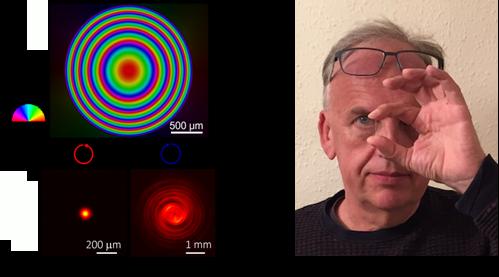
Laser Writing Transforms Flat Optics and Data Storage in Glass

(Left) Birefringence image of a flat lens and intensity patterns of 488 nm laser beams with different handeness circular polarizations focused and defocused by the same lens. The focal lengths are ± 208 mm. (Right) The same lens corrects short -5 D and long +5 D sightedness.
Credit by Masaaki Sakakura, Yuhao Lei, Lei Wang, Yan-Hao Yu, and Peter G. Kazansky
In addition, the technologies of birefringence patterning have been also used for generating light beams with spatially variant polarization known as vector beams, in particular with radial or azimuthal polarization. Radially polarized vector beams are especially interesting due to the non-vanishing longitudinal electric field component when tightly focused, allowing superresolution imaging.
Radial polarization is also the optimal choice for material processing. On the other hand, azimuthal vector beams can induce longitudinal magnetic fields with potential applications in spectroscopy and microscopy. Nonetheless, generating such beams with high efficiency is not a trivial matter.
In an article published in Light Science & Applications, scientists from the Optoelectronics Research Centre, University of Southampton, UK, demonstrated a new type of birefringent modification with ultra-low loss by ultrafast laser direct writing in silica glass.
The discovered birefringent modificati which is completely different from the conventional one originating from nanogratings or nanoplatelets, contains randomly distributed nanopores with elongated anisotropic shapes, aligned perpendicular to the writing polarization, which are responsible for the high transparency and controllable birefringence.
The birefringent modification enabled fabrication of ultra-low loss spatially variant birefringent optical elements including geometrical phase flat prism and lens, vector beam converters and zero-order retarders, which can be used for high power lasers.
The high transmittance from UV to near-infrared and high durability of the demonstrated birefringent optical elements in silica glass overcome the limitations of geometrical phase and polarization shaping using conventional materials and fabrication methods including photo-aligned liquid crystals and meta-surfaces.
“We observed ultrafast laser induced modification in silica glass with the evidence of anisotropic nanopore formation representing a new type of nanoporous material.”
“The technology of low loss polarization and geometrical phase patterning widens the applications of geometrical phase optical elements and vector beam convertors for high power lasers and visible and UV light sources.”
“The space-selective birefringent modification with high transparency also enables high capacity multiplexed data storage in silica glass.”















